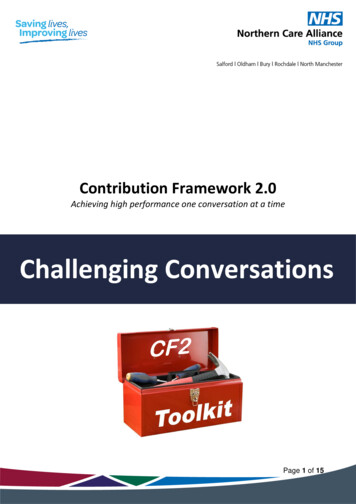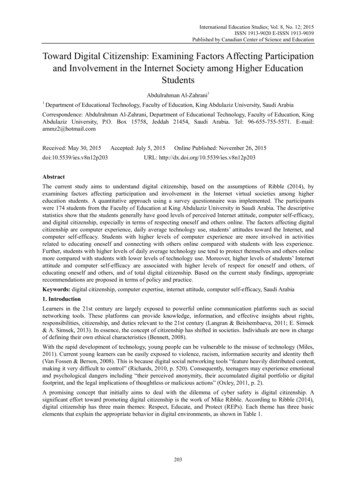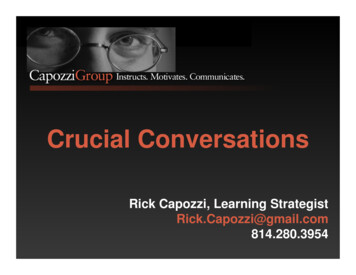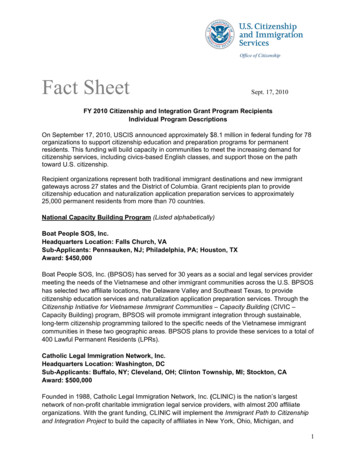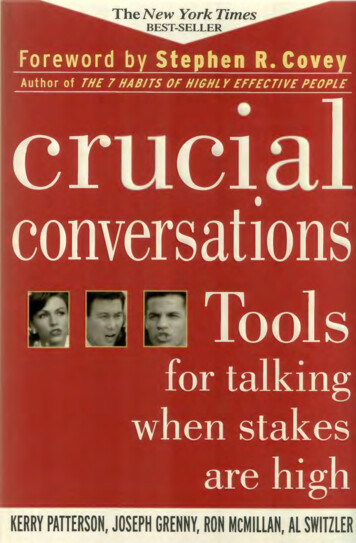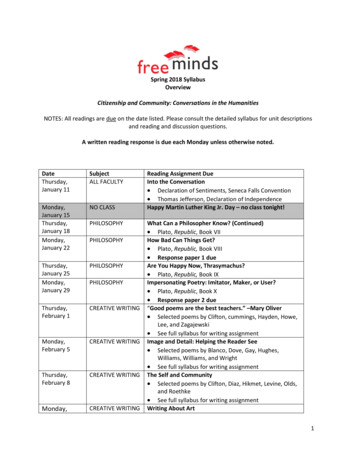
Transcription
Spring 2018 SyllabusOverviewCitizenship and Community: Conversations in the HumanitiesNOTES: All readings are due on the date listed. Please consult the detailed syllabus for unit descriptionsand reading and discussion questions.A written reading response is due each Monday unless otherwise noted.DateThursday,January 11SubjectALL FACULTYMonday,January 15Thursday,January 18Monday,January 22NO CLASSThursday,January 25Monday,January 29PHILOSOPHYThursday,February 1CREATIVE WRITINGMonday,February 5CREATIVE WRITINGThursday,February 8CREATIVE WRITINGMonday,CREATIVE WRITINGPHILOSOPHYPHILOSOPHYPHILOSOPHYReading Assignment DueInto the Conversation Declaration of Sentiments, Seneca Falls Convention Thomas Jefferson, Declaration of IndependenceHappy Martin Luther King Jr. Day – no class tonight!What Can a Philosopher Know? (Continued) Plato, Republic, Book VIIHow Bad Can Things Get? Plato, Republic, Book VIII Response paper 1 dueAre You Happy Now, Thrasymachus? Plato, Republic, Book IXImpersonating Poetry: Imitator, Maker, or User? Plato, Republic, Book X Response paper 2 due“Good poems are the best teachers.” –Mary Oliver Selected poems by Clifton, cummings, Hayden, Howe,Lee, and Zagajewski See full syllabus for writing assignmentImage and Detail: Helping the Reader See Selected poems by Blanco, Dove, Gay, Hughes,Williams, Williams, and Wright See full syllabus for writing assignmentThe Self and Community Selected poems by Clifton, Diaz, Hikmet, Levine, Olds,and Roethke See full syllabus for writing assignmentWriting About Art1
February 12Thursday,February 15Monday,February 19ART HISTORYThursday,February 22CREATIVE WRITINGMonday,February 26U.S. HISTORYThursday,March 1U.S. HISTORYMonday,March 5U.S. HISTORYThursday,March 8U.S. HISTORYMonday,March 12Thursday,March 15Monday,March 19NO CLASSThursday,March 22Monday,ART HISTORYCREATIVE WRITINGNO CLASSU.S. HISTORYWRITINGSelected poems by Auden, Cisneros, Daniels, Guerrero,and Komunyakaa See full syllabus for writing assignmentTrip to the Blanton Museum of ArtConsidering Lines, Titles, Beginnings Selected poems by Bishop, Brooks, Gay, Hughes,O’Hara, and Pinsky See full syllabus for writing assignmentRevision: Seeing Again “The Energy of Revision” from The Poet’s Companion,Kim Addonizio and Dorianne Laux T.S. Eliot, “The Love Song of J. Alfred Prufrock” See full syllabus for writing assignmentCitizenship and Community in U.S. History Selected works by Adams, Jefferson, Hamilton,Madison, and Smith Response paper 3 dueChallenging the Limits of US Citizenship (1820s-1850s) Memorial of the Cherokee Nation, “A Declaration ofSentiments and Resolutions,” Selected works by Jackson, Walker, and Douglass**poetry portfolio due tonight**Douglass and the Transformation of American Slavery(1830s-1840s) Frederick Douglass, A Narrative of the Life of FrederickDouglass: “Preface,” “Letter,” and chapters I-VII Response paper 4 dueGender and Slavery (1840s-1860s) Frederick Douglass, Narrative, Chapters VIII-IX Harriet Jacobs, Incidents in the Life of a Slave Girl(excerpts)Enjoy your Spring Break!Enjoy your Spring Break!The Debate over Slavery and the Fracturing of AmericanPolitical Community (1840s-1850s) Douglass, Narrative, Chapters X, XI, and “Appendix,” selected works by Douglass, Hammond, and Fitzhugh Response paper 5 duePicturing Frederick Douglass Frederick Douglass, "Pictures and Progress”First Steps of the Writing Process2
March 26Thursday,March 29WRITINGMonday,April 2WRITINGThursday,April 5Monday,April 9U.S. HISTORYThursday,April 12U.S. HISTORYMonday,April 16U.S. HISTORYThursday,April 19Monday,April 23WRITINGThursday,April 26Monday,CREATIVE WRITINGU.S. HISTORYART HISTORYCREATIVE WRITINGLunsford, EasyWriter, Chapter 2, “Exploring, Planning,and Drafting” Mairs, “Disability” See full syllabus for writing assignmentExamples and Conclusions Aaron, 40 Model Essays, Chapter 3, “Example” Klass, “She’s Your Basic L.O.L. in N.A.D.” Graff and Birkenstein, They Say, I Say, Chapter 7, “Sowhat? Who Cares?” See full syllabus for writing assignmentRevision Lunsford, EasyWriter, “The Top Twenty,” pages 1-15and Chapter 4, “Reviewing, Revising, and Editing” See full syllabus for writing assignment**Rough draft for Spring Formal Paper due**Remaking Citizenship After Civil War (1860s-1880s) Selected excerpts and works by Douglass and SumnerJim Crow, the Dawes Era, and Second-Class Citizenship(1890s-1910s) Selected works from Washington, The NiagaraMovement, Wells-Barnett, Pratt, and Ah-Nen-La-Di-Ni Response paper 6 dueImmigration and Citizenship (1880s-1960s) The Chinese Exclusion Act Selected works from the US Department of Labor,Clancy, readings by and about the Ku Klux Klan, andGuided Activity on the Bracero Program**Spring Formal Paper Due**The Civil Rights Movement and Its Legacies, (1960spresent) Selected works by King, Malcolm X, Steinem, TheCombahee River Collective, and The Movement forBlack Lives Response paper 7 dueWriting to Reflect See full syllabus for assignmentHow Memorials and Monuments Can Shape the Beliefsand Attitudes of a Community Mayor Mitchell J. Landrieu, City of New Orleans,“Truth: Remarks on the Removal of ConfederateMonuments in New Orleans” Response paper 8 dueRevisiting Our Stories See assignment sheet for detailsHow Language Shapes Experience3
April 30Thursday,May 3Monday,May 7Thursday,May 10Monday,May 14 CREATIVE WRITINGCREATIVE WRITINGLAST CLASSALL FACULTYSee assignment sheet for detailsWrapping It All Up See assignment sheet for detailsFinal Class Reading See assignment sheet for detailsSharing and Appreciation**Final portfolio and essay due tonight**Portfolio conferencesGraduation is tentatively scheduled for Monday, May 21.4
DETAILED SYLLABUSAlways read this section to prepare for class.Thursday, January 11Spring OrientationWe will start off the semester by previewing the themes, texts, and key assignments that we will journeythrough together in the months ahead. We’ll take a moment to review our class policies and proceduresand dive into our discussion.Read: The Declaration of Sentiments, Seneca Falls Convention (handout) and the Declaration ofIndependenceMonday, January 15In observance of MLK Day, we will not meet for class.Thursday, January 18Philosophy Unit with Dr. Matthew Daude LaurentsUnit Overview: Spring Semester: Plato’s Republic Rides AgainThis spring semester, we will continue our reading of Plato’s Republic. In the fall, we made our waythrough books I through VI, in which we traced Plato’s “set-up” for the discussion of the ideal city as ameans of discovering the true nature of justice and the identification of justice with the harmonyproduced when each part of the city (or the soul) is doing its own proper work.To prepare for the rest of our journey, think back on the themes of our discussions about the first booksand review your notes. It might be helpful for you to review the “Read me first” handout from fall, butlet me highlight two important principles: (1) Breathe normally, and (2) read all the words in orderbefore you let yourself get bogged down with details.Remember that I’m your guide (!), so you don’t have to find your way in the dark totally on your own.Our class discussion will be about way-finding in this complex, murky text, so don’t worry too much ifyou don’t feel confident that you know what’s going on. You will, but it’s important to breathe so youdon’t get so frustrated that you close the book.As was our practice last fall, I’ve given you a reading assignment for each philosophy class, and with thatassignment you have two resources. I have indicated passages that will serve as the major theme for ourclass discussion, and I’ve given you some questions to help you with the reading. Keep these questionsin mind as you read the words (in order).One final thought as we prepare for another dive into Plato: Reading a text is a conversation, and whatyou get out of any conversation is closely related to what you bring to the table. This implies that you —the real you, with your own perspectives and experiences — need to stay engaged with Plato and whathe says, but you also need to try to hear him in what he is saying to you. Hearing is pretty easy; listeningis more challenging, and understanding takes work. This is why, in academic conversations of all kinds,we tend to be focused a lot on the text: This is our way of conversing with people who can’t just answer5
our questions, because, for instance, they’re dead. Their words, the words they chose to reveal theirideas to us — words are all we have, but we can’t sit passively and let the words wash over us, like lyingon the couch and listening to Pink Floyd. We have to be active partners in the conversation, sensitive tothe fact that we are engaging another mind with something to say. The opposite of letting Plato washover you passively is seeing only yourself reflected back, like a big Plato-mirror. Here’s a silly example: IfI told you that Book VI of the Republic is really about the best way to cook nutritious meals, you’dprobably wonder which Book VI I’d been reading, right? Going back again and again to the words in thetext is what keeps us honest about just looking in a mirror!That’s plenty of advice for now. Get busy with book VII — Plato still has some surprises in store, I’ll bet.Happy philosophizing!Philosophy Class 6: What Can a Philosopher know? Continued . . .Read: Republic, Book VII. Concentrate on 514a-519e and 535a-536dDiscussion Questions: Why does Socrates tell the story about the Cave? What does this story tell usabout the proper education of the philosopher? Why do we call this story an allegory?Think: Is the city ruled by philosophers complete? (As in, completely complete? We’ve heard thisbefore!)Monday, January 22Philosophy Class 7: How bad can things get?Read: Republic, Book VIII. Concentrate on 544d-546c and 561a-bDiscussion Questions: Why does Socrates think that the ideal city will decline? Into what will the citydegenerate? How is the explanation of this decline based on the big letters/small letters argument?Response Paper Prompt:What is democracy, according to Socrates? Where does democracy fall in the degeneration of the idealcity? Why? (Hint: What are the five types of “rule” or constitutions by which people might governthemselves?)Thursday, January 25Philosophy Class 8: Are you happy now, Thrasymachus?Read: Republic, Book IX. Concentrate on 580a-c and 583b-588bDiscussion Questions: Which ruler has the best life? Which has the worst? Why?How does Socrates answer Thrasymachus’ claim about justice and power? Why does he bring up theidea of pleasure? What are the types of pleasures that correspond to the types of ruler? Is a particularsort of pleasure superior to the others? Why?6
Monday, January 29Philosophy Class 9: Impersonating Poetry: imitator, maker, or user?Read: Republic, Book X. Concentrate on 595a-608bDiscussion Questions: Do poets write about the truth? In what way? Do poets have to know whatthey’re talking about? Could a poet teach you about virtue? Could a poet teach you to be virtuous?Think: Why does Plato leave the door open to the possibility that poetry might be rehabilitated (607b608b)?The Last Word: ErWhy does Socrates introduce Er at the end of the Republic? Who is Er? What is Er’s story? How does thestory of Er complete the argument that Socrates makes against Thrasymachus?The End: We made it! You’ve read all of one of the most influential books in Western history!Welcome to the club.Response Paper Prompt:Now, let’s pretend:You are Socrates, and I’ll be Thrasymachus. Write a (one-page) letter to me in which you explain yourmain argument about why my concept of justice as “the advantage of the stronger” is wrong.Breathe normally, be brief.Thursday, February 1Creative Writing Unit with Vivé Griffith, MFAUnit Overview: I am excited to be back to write with you this spring! We will begin our time togetherwith a unit focused on poetry. We’ll read poetry, and we’ll write some too. Then at the end of thesemester we’ll write together to try to interrogate, honor, and express our shared in experience in FreeMinds.The first poems we know of are the great epics, poems like The Odyssey that try to capture the essenceof a culture and a people. They were created to be sung, and the rhythm and rhyme we now think of asessential to poetry were part of the song. Those musical qualities also served as mnemonic devices,enabling the bard to remember what to sing. (This still happens today. Think of how you can rememberthe lyrics of a song you haven’t heard in many years.)But the epic poems gave us additional gifts. You might say that the themes of citizenship and communitywere woven through those works. And significant parts of what we know of ancient cultures comethrough their writing. For example, we know that hospitality was important to the ancient Greeks in part7
because in The Odyssey the character of Odysseus comes home disguised as a stranger. He is welcomedin and his feet are cleansed with oil, because guests are treated with respect in that world.Contemporary poetry tends to focus less on the larger questions of culture and more on individualperspectives. Poems are more likely to explore the self, the family, and the local. We have to scratch alittle to see how citizenship and community are embedded there. Yet they are, and poems are still theplaces we grapple with identity, with expressing the human experience on paper. In this unit, we’ll lookat how poets do that, and then we’ll work on doing it ourselves. We’ll be driven by craft, exploring whatI like to call the “tools of the trade.” We’ll discover how poets create their poems, and we’ll let themguide us into creating our own.TextsFor this unit we will use a packet of selected poems, and we may refer back to Bird By Bird, by AnneLamottAssignmentsFor each class in this unit, you will have a reading assignment and a writing assignment. The readingsmay seem short, but poems are rich and require multiple readings. Make sure to read them out loudand to take the time to sit with what they are saying. For the writing assignment, dive in. We will comeback to our early drafts and revise them with our growing understanding of poetic craft. The lateassignment policy in this unit mirrors that for your response papers – I will only accept late work oneclass period after it is due, and then for 50% credit.Creative Writing Class 4: “Good poems are the best teachers.” –Mary OliverWhat makes it a poem? Is it a poem simply because of the line breaks? Or is there another thing thatmakes something considered a poem instead of, say, a story or an essay?Emily Dickinson is quoted as saying: “If I feel physically as if the top of my head were taken off, I knowthat is poetry.” Do we want to hold it to the same standards?What makes someone a poet? Does simply writing a poem make a poet, or are there other things thatgo into deserving the title? (Is it a title?)In the poetry unit, we’ll play with these questions, looking at a number of poems to determine whatholds them together as a genre and considering the act of writing them.Today we’ll talk about poems by exploring some good ones, and we’ll consider what poet Ted Koosercalls “the poet’s job description.”Read: Lucille Clifton, “Won’t You Celebrate with Me?”e.e. cummings, “anyone lived in a pretty how town”Robert Hayden, “Those Winter Sundays”Marie Howe, “What the Living Do”8
Li-Young Lee, “From Blossoms”Adam Zagajewski, “Try to Praise the Mutilated World”Write:For your first assignment, start with a 10-minute free writing, using one of these prompts: “I remember”or “I don’t remember.” Keep your hand moving and don’t worry about making things perfect.Now, shake out your hand, take a walk around the room, and re-read your free write. What onesentence or idea surprises or excites you? Make it the first line of your poem.Bring to class a poem of at least 10 lines. Make sure it has line breaks and don’t make it rhyme. (We’lltalk about why in class.) Think about what impressed or moved you in the poems we read for classtoday. What can you incorporate into your own poem?Monday, February 5Creative Writing Class 5: Image and Detail: Helping the Reader SeeTwo related ideas—image and details—are critical to poetry. They act as counter to abstraction—ideasseparated from the concrete like “liberty” and “harmony.” Today we’ll read poems that are rooted inconcrete image, painting a vivid picture for the reader. Often, there will be a great deal of emotion inthese poems, but the poems don’t talk about emotion. They create emotion by precisely describingsomething to which we have an emotional reaction.From The Poetry Dictionary by John Drury:Image, Imagery(ím-idge; Latin, “likeness, semblance, picture, concept, imitation or copy”) Amental picture; a concrete representation of something; a likeness the senses can perceive.Ezra Pound says that an image “presents an intellectual and emotional complex in aninstant of time.” A poetic image transfers itself to our minds with a flash, as if projected upon amovie screen. Many images, such as “bracelet in a wheel barrow,” appeal primarily to thesense of sight. But an image can invoke the other senses too, as in “a sniff of perfume,” or a“jangling of banjoes,” or a “scratchy blanket,” or a “tart cherry.” Images serve as the poem’sevidence.Poetry without images, or with too few, seems vacant, generalized, uncompelling. Butstale images are no substitute for the real thing, which must hit us as a discovery, howeversmall. When reading the poems in today’s assignment, pay very close attention to how they use image. Youmight underline specific images as you read.9
Read: Richard Blanco, “Looking for the Gulf Motel”Rita Dove, “Daystar”Ross Gay, “Ode to Drinking Water from My Hands”Langston Hughes, “Harlem”Miller Williams, “Let Me Tell You”William Carlos Williams, “The Red Wheelbarrow”James Wright, “Lying in a Hammock at William Duffy’s Farm in Pine Island, Minnesota”Write:Write a poem about a single day. It might be a full day, like Rita Dove’s “Daystar.” It might be a momentwithin that day, when revelation came, or didn’t, like James Wright’s “Lying in a Hammock ” It might bethe way a day in the past felt, like Ross Gay’s poem.Choose your day and make a list of sensory details from that day. What did it taste like, smell like, feellike, look like, sound like? What about images? What would bring the day to life for your reader?Now write your poem. Make sure it is full of detail and image and doesn’t include abstractions like“hope,” “pain,” “longing,” or “liberty.” If you want us to feel something, let the details and images offerthat to us.Thursday, February 8Creative Writing Class 6: The Self and CommunityPoets today often plumb their personal experience to find material for poems. This, however, doesn’tmean that the poems exist simply to be therapeutic, or that their personal experience exists in isolation.We relate to each other through personal experience, and the best poems resonate for us because whatthey are revealing is relevant not just for the poet, but for the reader too. Often, these personal poemsspeak to our larger world and communities as well. Look for that familiarity in the poems you read fortonight.Read: Lucille Clifton, “Homage to My Hips”Natalie Diaz, “No More Cake Here” and statement about “No More Cake Here”Nazim Hikmet, “Autobiography”Philip Levine, “You Can Have It”Sharon Olds, “Language of the Brag”Theodore Roethke, “My Papa’s Waltz”Write:Notice the way the poets we read for today bring stories of their own lives into their poems, and theway they strive to be universal while doing so. When we write about ourselves, we explore who we are.When we write about ourselves, we give voice to our communities and worlds.10
For today, write a poem based on Nazim Hikmet’s poem “Autobiography.” Title your poem“Autobiography” and make sure that, like Hikmet, you include names and places, and very specific,concrete details. And remember, each of our lives is far larger than what can be contained in a singlepoem, writing an autobiography requires that you choose your details with care. Learning to choose theright details or image or metaphor is key to every poem you write.Monday, February 12Creative Writing Class 7: Writing About ArtWe have a great opportunity this spring to explore ekphrastic poetry. The word comes ekphrastic fromthe Greek “ek” and “phrasis,” “out” and “speak” respectively. The verb “ekphrazein” means to proclaimor call an inanimate object by name (according to Wikipedia). In simple terms, it is poetry that respondsto another work of art, most often to visual art. Ekphrastic poetry has a long history, going backthousands of years. American poets have often written ekphrastic poetry, and you will join that traditionthrough our visit to the Blanton Museum.Read: W.H. Auden, “Musée de Beaux Arts” and William Carlos Williams, “Landscape with the Fall ofIcarus,” both in response to Pieter Bruegel’s “Landscape with the Fall of Icarus” Sandra Cisneros, “My Wicked Wicked Ways,” in response to a personal photograph Kate Daniels, “War Photograph,” in response to Vietnam War photograph by Nick Ut Laurie Ann Guerrero, “Last Meal: Breakfast Tacos, San Antonio, Tejas,” in response to “BreakfastTacos” by Chuck Ramirez Yusef Komunyakaa, “Facing It,” in response to the Vietnam War Memorial in Washington, DCWrite:Find an image you love. Maybe it’s something that Janis shared with you in the Art History unit this year.Maybe it’s a print you have on your wall or something made by a family member or friend. You canconsider paintings, photographs, sculptures, any piece of art.Now, write a poem of response. Maybe you want to do that by writing very descriptively about thework. Maybe you want to write a story that connects to it instead. Maybe the art elicits an experiencefrom your own life – write it! Maybe you have something you want to say to the artist.We’ll spend a lot of time looking at different ways to write ekphrastic poems. To begin with, follow yourinstincts. Let the art inspire you.Thursday, February 15Art History Class 7: Visit to the Blanton Museum of Art on UT CampusNo writing or reading due in class tonight. See Blanton trip handout for details and enjoy the museum!11
Monday, February 19Creative Writing Class 8: Considering Lines, Titles, BeginningsHow do we make someone care about our poem? How do we draw someone in and get them to keepreading? How do we decide where to begin?All of these questions sit at the core of the writing experience, and they can either halt us from writingor make us dive in. Today we’ll look at how a number poems to help us determine how a good poeminvites the reader in. As you read, consider: Does the title intrigue me? Why or why not? How does the title relate to the rest of the poem? How does the poet invite the reader in? What clues do we get that the writer is aware of his or her reader? In other words, how do weknow that he or she has considered the audience?We will also talk today about line breaks and look at how a poem changes based on how the lines arebroken. Pay attention to that in the poems you read for today.Read: Elizabeth Bishop, “One Art”Gwendolyn Brooks, “We Real Cool”Ross Gay, “Ode to Buttoning and Unbuttoning My Shirt”Langston Hughes, “The Negro Speaks of Rivers” and “I, Too”Frank O’Hara, “The Day Lady Died”Robert Pinsky, “Shirt”Write:Tonight you will turn in two poems! First, you’ll have drafted a poem at the Blanton Museum. Pleaseturn that in, in addition to one more poem inspired by today’s reading.The poems we’re reading today deal with a series of topics – loss, race, the death of a famous person, aspecific place. Two of them focus on shirts (in very different ways). Let these topics guide you inchoosing something to write about for tonight. The choice is yours, but I suggest you try to stay small.Look at how Ross Gay can create an entire world from something as small as buttoning and unbuttoninga shirt. See if you can do something similar.Your poem should be at least 10 lines long and contain a thoughtful title and opening.Thursday, February 22Creative Writing Class 9: Revision: Seeing Again“I have never thought of myself as a good writer. But I’m one of the world’s great rewriters.” James A.Michener12
**Interviewer: How much rewriting do you do?Hemingway: It depends. I rewrote the ending of Farewell to Arms, the last page of it, 39 times before Iwas satisfied.Interviewer: Was there some technical problem there? What was it that had stumped you?Hemingway: Getting the words right.(Ernest Hemingway, "The Art of Fiction," The Paris Review, 1956)**The main thing I try to do is write as clearly as I can. I rewrite a good deal to make it clear.(E.B. White,The New York Times, August 3, 1942)**Revision is literally and figuratively the act of “seeing again” or, as Natalie Goldberg says, “envisioningagain.” We are asked to remember that writing is a process and that pieces evolve over time. We mustsee our work in a new light and rework it to bring it closer to completion.All writers revise, and the best writers revise a lot. The short story writer Raymond Carver wrote 20 to30 drafts of his stories before he was satisfied. “It’s something I love to do,” he said, “putting words inand taking words out.”Today we will explore the act of revision and work through exercises to help revise the six (or more)poems we’ve written this semester. Try to approach revision with an openness to the idea that thefinished poem may look very different from the one you started with.Read: “The Energy of Revision” from The Poet’s Companion, Kim Addonizio and Dorianne Laux T.S. Eliot, “The Love Song of J. Alfred Prufrock”Write:Read through the six poems you’ve written during this unit. Look at and consider my comments on yourpoems. Then start revising. Mark out words that aren’t working, add lines or stanzas as needed. Use thetips in today’s reading to help you along.Then make a list of at least three additional revisions you believe each poem needs. Bring those to classwith you. We’ll work on them together.13
Monday, February 26U.S. History Unit with Dr. Shirley ThompsonUnit Overview: Citizenship and Community in US HistoryWhat visions of community have driven the history of the United States? How have individuals andgroups defined the status and duties of citizens? On what basis have people and groups been excludedfrom citizenship and belonging in American society? At the nation’s inception, the founders of the U.S.took it upon themselves to articulate explicitly the meaning and scope of American politics, andsubsequent generations continued to draw boundaries separating those who mattered and those whodidn’t. Over the years, members of excluded groups—African-Americans, women, Native Americans,immigrants, the poor, etc.—have formulated their own visions of community. From the founding of thenation to the present day and points in between, we will engage with thinkers from the past as theydefined, contested, and refined the categories and values that govern political and social life in theUnited States.Even though we will proceed roughly chronologically and I provide historical context and background foreach class, our goal will not be simply to learn what happened when. Rather, our aim is to get a sense ofhow contentious history has been, and to practice the historian’s craft of reconstructing the debates andmotives of past generations to have a clearer understanding of what is at stake in the debates of today.To that end, we will be conducting close and contextualized readings of primary documents, theevidence that historians use to make their arguments about the significance of events and issues in thepast. You will notice that many of these documents are speeches, declarations, addresses, statements—consciously public utterances that reflect the civic and persuasive demands of citizenship andcommunity-building.U.S. History Class 1: Paradoxes of Slavery and Freedom in the New Republic (1770-1780s)Background: On July 4, 1776, after more than a year of intense fighting, the thirteen colonies of BritishNorth America formally broke from the England to form the United States of America. Eleven yearslater, the leaders of the new nation would further shape the political and economic structure of the USby writing and adopting a Constitution which separated, extended, and enumerated the powers of thefederal government. From its origins, the country wrestled with the paradoxes of slavery and freedom.Even as the founders defended their right to “independence” by using the language of “freedom,”“liberty,” and “equality,” they held people of African descent as slaves and denied women equalcitizenship rights. The right to vote, among the most coveted of these citizenship rights, was reservedfor propertied men in most states. When England raised taxes on the American colonists through tariffson imported goods, colonists resisted what they considered to be the “tyranny” of taxation withoutrepresentation and boycotted English merchandise, in one famous instance dumping large amounts oftea into Boston Harbor. In recent years, American colonists had become major players in the lucrativetransatlantic trade in slaves, sugar, and rum, and many influential colonists understood the fight for“independence” as the quest to pursue that trade independently of England.The primary documents for this week provide several windows into this paradoxical context of freedomand slavery. The Declaration of Independence (DOI), was issued and signed by a majority ofrepresentatives to the Second Continental Congress, the body created to coordinate negotiations with14
and war against Great Britain. Pay special attention to the two paragraphs at the beginning and the twoparagraphs that close the document, while skimming the l
“The Energy of Revision” from The Poet’s Companion, Kim Addonizio and Dorianne Laux T.S. Eliot, “The Love Song of J. Alfred Prufrock” See full syllabus for writing assignment Monday, February 26 U.S. HISTORY Citizenship and Community in U.S. History Selecte
